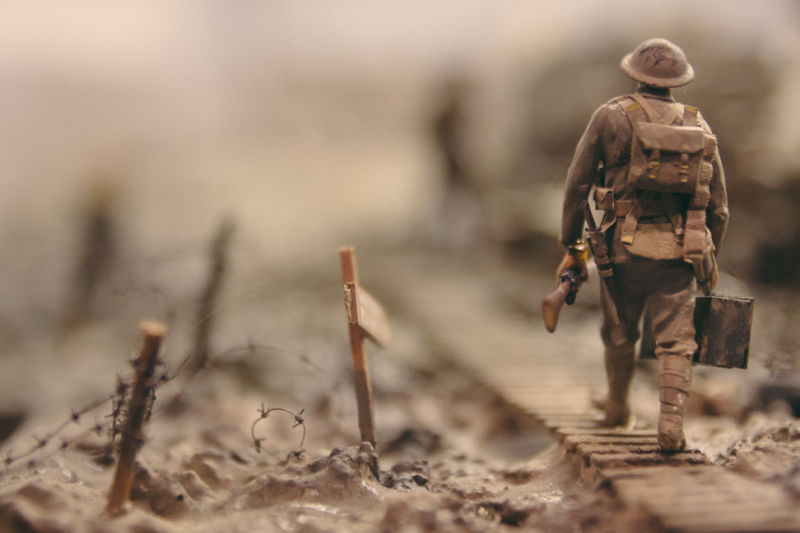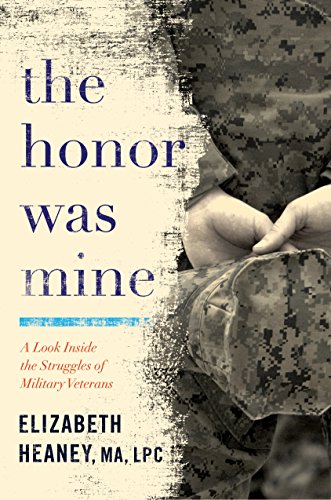Coping with Veterans’ Grief
This article about veterans’ grief by Lesley Postle, Editor of this site, is the result of two extensive interviews with therapists Dr Matthew Welsh, MS, PhD., and Bob Kauffman, LCSW., from Choosing Therapy who have many years of experience working with the military and returning veterans. We would like to thank them both for their invaluable contributions.
 Photo by Stijn Swinnen at Unsplash
Photo by Stijn Swinnen at UnsplashVeterans Often Experience Multiple Grief
Veterans, like other human beings, will experience grief when they lose something or someone that have given meaning to their life. Sadly, that does not always mean that they will express their grief.
In addition, Veterans often experience many different types of grief. For example, if someone close to them in the military dies, then they will grieve that death. This article expresses just how deep that grief can penetrate a soldier’s soul.
Sometimes, Veterans will also experience the loss of a comrade to suicide which sadly is all too common among returned service personnel especially amongst those with PTSD.
Recent research into Veteran’s grief has revealed that loss to suicide is much harder to handle than the loss of a friend in combat because combat deaths are expected and easier to accept.
However, Veterans don’t just grieve death. There are other losses they grieve. For example, they may grieve the loss of their limb if they lose an arm or leg in combat. Further, that loss of limb or any loss of physical mobility may result in the inability to perform daily activities, work, or other recreational activities. Thus, they may also grieve not being able to perform those activities.
Bob Kauffman added: “In my experience in working with active duty military as well as Veterans, they grieve from missing their families when they are deployed, from marriages failing which is quite high in the military, from losses of limbs or other physical losses due to combat and from missing the military when they retire.”
Veterans may also grieve job loss, loss of purpose and the loss of future experiences or expectations.
Another type of grief that Veterans may experience is complicated grief. Complicated grief is an extreme or complex type of grief that makes it difficult to resume daily activities of your life or function. However, most grief is not “complicated” and Veterans can still eventually return to their daily activities.
Returning to Civilian Life Can Exacerbate These Challenges
Grief is not just about death, people can grieve any loss. For instance, many Veterans struggle with the transition from military to civilian life. Some who struggle with that transition also experience mental illness, relationship problems, or unemployment. This may lead to grieving job loss, divorce, loss of purpose, or the loss of future expectations of what your life may have been had you not experienced physical and mental hardships.
Elizabeth Postle, author of this website, adds: “The total reliance on comrades in difficult combat situations gives these relationships a huge significance. Comrades all live and work together too, forming a close knit team which is very meaningful. It is a great support mechanism.
 Photo by Timon Studler at Unsplash
Photo by Timon Studler at UnsplashIn contrast, family life can be difficult and distant, a part-time affair. When the time comes to leave the close knit community in which they have played an important role, re-integrating into family life can be tough.
Where do you fit in to this new structure? What will your new future hold? The friends and comrades you relied on are still in the forces or live miles away. The initial excitement of being home with your loved ones can soon wear off and your family and friends feel like strangers to you.
Finances might be tight, and where do you look for a satisfying job? Does society welcome you with open arms? Often not.
We, as a society, owe you a huge debt of gratitude for your service, but sadly, in practical terms there is not always easy access to the support that is needed.”
Many can frequently feel lost and have little direction or purpose in their lives and sadly far too many Veterans end up homeless and on the streets.
Veterans often grieve the loss of their military identity. For instance, if a soldier retires from the military, then he or she may grieve the loss of being a soldier. It can be a difficult transition from military to civilian life and Veterans are often grieving the loss of their military identity and associated responsibilities or sense of purpose.
Returning to civilian life can exacerbate grief reactions for multiple reasons. One reason is that the military provides a high level of structure and training on how to be in the military. For example, when you are in the military they train you and tell you what to do and when you need to do it and even how much to weigh.
However, there is far less structure as a civilian. For example, no one is there to tell you where you need to be or what to do. Additionally, instead of being trained on what to do, there is no or little training for civilian life. This lack of training and structure can feel like a lack of support or structure for someone going through grief.
Further, many people in the military explain that they have a high level camaraderie and friendship in the military. These are people with whom you have served your country and gone into combat zones. Now, people lose that sense of camaraderie and close friendship and the feeling of being understood when they transition to civilian life.
Many people in the military say that civilians can never truly understand what they have gone through in the military or when they are grieving the death of someone. So, when they are civilians, they may have lost their friends, support system or people they feel like can really understand them. This may lead to isolation, lack of feeling understood, and lack of support system which can all make grieving much more difficult.
Finally, when people are in the military they have a mission of great responsibility. For example, they may have to guard a tank, fight in combat zones, secure intelligence, or have an administrative position. Many people in the military feel like they are grieving that loss of mission or purpose when they become civilians. They may feel lost, lack of meaning in life, or disconnected which makes grieving more difficult.
How Does Grief Differ from PTSD?
Bob Kauffman explains: “They are closely related. PTSD is directly related to a significant trauma that has engaged the sympathetic nervous system of the Veteran that causes the Veteran to be on guard constantly ready to fight, flee or freeze. The Veteran feels at great risk of losing his life or something extremely important to him and anything that reminds him of that triggers PTSD symptoms.
Grief can accompany PTSD in that the Veteran also experiences pain and grief from losses from the events that help create the PTSD. There is usually an element of grief when a Veteran has developed PTSD.
He can experience grief from significant losses, however, without developing PTSD.”
Click here to read more about the differences between grief and PTSD.
What Can Veterans Do to Help them Cope with their Grief?
Both of our experts in Veterans' grief were clear in how important it is for Veterans to express their feelings and emotions. Here is what each of them said:
Dr Matthew Welsh: “I would learn to practice non-judgmental acceptance of their grief and allow themselves to feel and express their emotions. Many Veterans are trained to avoid showing any emotion, especially sadness or fear. However, sadness and even fear may be part of the grieving process.
So, I would encourage Veterans to allow themselves to feel these emotions without judging themselves. There is nothing wrong or weak about grieving. It is a normal and natural part of being human and working through loss in life.”
Bob Kauffman: “I would advise them to express their grief as much as they can. When we responsibly express our feelings, grief included, those feelings complete themselves and we don’t have to keep feeling them. The difference between a feeling and an emotion is a feeling is experienced in the body and an emotion is a feeling expressed. When we don’t express our feelings they just stay in our body because feelings don’t know time.
The problem for Veterans is that they believe expressing feelings make them weak and they are supposed to just keep them inside and keep themselves from even being aware of them.
Society views the expression of feelings, especially sadness and pain, as meaning that there is something wrong with the person or that they are falling apart which is not true. Veterans need to be encouraged to be aware of their feelings and to express them responsibly.”
Strategies to Help Veterans Communicate their Feelings to Friends and Families?
Bob Kauffman says: “It is important to help veterans see that they have faulty beliefs about their feelings and their expression of feelings. They need to know that the expression of their feelings, although uncomfortable at first, will lead to their healing.
It is often important to educate family and friends on how to make it safe for Veterans to express their feelings and to provide them a safe place for them to do it. Often family and friends are also uncomfortable with the expression of feelings, especially grief. The whole family system often needs education.”
Here is some specific advice from Dr Matthew Welsh on how YOU can share your feelings:
- Make sure you have friends and family members who you can trust to be empathetic and understanding when you share your feelings.
- Try to identify your emotion and the intensity or severity of your emotion.
For example, there is a difference between feeling somewhat down about something and severely depressed. It is helpful to identify your emotion because often times simply identifying it, naming it and sharing or expressing it will help to decrease the intensity or severity of it. Additionally, if you can share the severity of it then that can help others better understand your experience and if you need additional support or mental health treatment.
Dr Matthew Welsh has a blog with many useful resources to help you with inner awareness, with articles on mindfulness, meditation, yoga, inspiring music and even TV programmes.
Other Ways of Expressing Feelings
We also have various pages on this site to help you with expressing your feelings:
Expressing Grief through Art, Music and Dance
There are also lots of more unusual ways of finding self-awareness and meaning in life again such as equine therapy and other animal related therapy programmes.
How Should Veterans Seek Grief Support?
It can be a good idea to seek out people who have successfully navigated grief themselves and are comfortable educating and guiding you in the process of successfully grieving.
One of the best ways to find support if you are a Veteran who is grieving is to participate in a group of other Veterans.
You can do this by registering at your local Veterans Affairs hospital or Veteran Center.
A Veteran Affairs hospital has licensed social workers, mental health counselors, and psychologists who can refer you to a grief group at the Veterans Affairs hospital or community.
The kind of group depends on what you are looking for. Some Veterans prefer groups that have other Veterans. Some Veterans prefer not to have other Veterans. Additionally, some people may prefer to have a group of people with the same gender, ethnicity, race, or age group to help them feel more understood.
It is best to find a grief group that you feel most comfortable with.
There is also a lot of support and resources available via the Veterans Support Foundation. There are similar organisations in many other countries.
There are also many online Veterans’ support groups if you do a search on Facebook in the groups section.
If you’re not comfortable with groups, you may also want to consider one-on-one grief counseling. We have partnered with Better Help below who offer this service online.
We express our heartfelt thanks to Dr Matthew Welsh and Bob Kauffman for providing us with their expertise and most of the information in this article.
Dr Matthew Welsh, MS, PhD
Matthew is a licensed clinical psychologist at a Veteran Affairs hospital providing psychotherapy to Veterans. He is also an author at ChoosingTherapy.com. He has his own blog about mindfulness resources and has also written a novel about finding meaning in life.
Bob Kauffman, LCSW
Bob is the founder of Critical Thinking for Success which helps companies successfully deal with problems that are brought to the workplace by the personal lives of their employees. CTFS consults with individuals, families, businesses and the military. For over ten years, he has treated active duty military and veterans for head injuries and PSTD. Robert is also an author at ChoosingTherapy.com.
Recommended Read:
The Honor Was Mine –
A Look Inside the Struggles of Military Veterans
by Elizabeth Heaney
An exploration of the emotional aftermath of war. The memoir of a counselor who left her practice to work on military bases.
Where to get help:
Have You Considered One-on-One Online Grief Counseling?
Get Expert and Effective Help in the Comfort of Your Own Home
The following information about online counseling is sponsored by 'Betterhelp' but all the opinions are our own. To be upfront, we do receive a commission when you sign up with 'Betterhelp', but we have total faith in their expertise and would never recommend something we didn't completely approve.
Do you feel alone and sad with no support and no idea how to move forward? It can be tough when you are stuck in grief to find the motivation to get the most out of your precious life.
Online counseling can help by giving you that support so you don't feel so alone. You can have someone to talk to anytime you like, a kind and understanding person who will help you to find meaning in life again, to treasure the memories of your loved one without being overwhelmed and to enjoy your activities, family and friends again.
- Simply fill out the online questionnaire and you will be assigned the expert grief counselor most suitable for you. It only takes a few minutes and you don't even have to use your name.
- Pay an affordable FLAT FEE FOR UNLIMITED SESSIONS.
- Contact your counselor whenever you like by chat, messaging, video or phone.
- You can change counselor at any time if you wish.
- Click here to find out more and get started immediately.
- Or read more about how online counseling works here.
Sales from our pages result in a small commission to us which helps us to continue our work supporting the grieving.
Hypnosis for Grief - 10 Ways It Can Help You
Try a gentle hypnotherapy track to relax the mind. Learn how self-hypnosis can help you cope with grief at any time of the day or night.

- Grief and Sympathy Home
- Other Types of Grief
- Veterans' Grief







